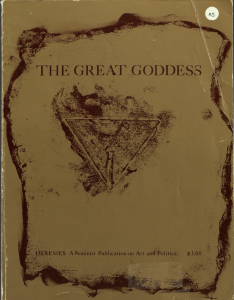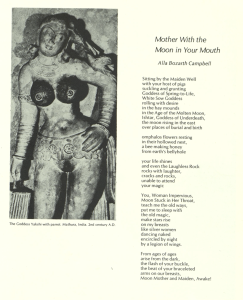In 1978, Heresies, a radical feminist publication, released a special edition issue that examined the idea of Goddess spirituality through a culmination of different literary works as well as depictions of female goddesses around the world. This issue was titled The Great Goddess, as it expresses the importance of female spirituality and the beliefs in female goddesses. In The Three Faces of Goddess Spirituality Merlin Stone outlines three different emerging aspects of Goddess Spirituality: the interest in the history of ancient cultures that praised female deities, the growing concern of feminist theology and spirituality and the concern for how male-centered religions have institutionalized the secondary status of women (Stone 2-3). By outlining these

5th Issue of Heresies, 1978
aspects, Stone clearly emphasizes the importance of Goddess spirituality. She explains that, “Goddess spirituality offers us the immediate and inherent refutation of institutionalized ‘religious’ values that have far too long been used as weapons of oppression” (Stone 4). In other words, the value of Goddess spirituality offers women a form of rejection of traditional religious values that have been the root of their oppression. Later in the article, Stone makes a similar point to Mary Daly as she asserts that, “Goddess spirituality has grown from our continually feeling, speaking, comparing, analyzing, feminist-consciousness raising process – the very core of our new perceptions and thus motivating energies” (Stone 4). The idea of Goddess spirituality and the rejection of male-centered religions derives from women feeling empowered to express their sentiments in a multitude of ways. This same argument is expressed by Carol P. Christ in Why Women Need the Goddess as she states, “This new mood of affirmation of female power leads to new motivations; it supports and undergirds women’s trust in their own power and the power of other women in family and society” (Christ).
An important poem that is included is “Mother With the Moon in Your Mouth” by Alla Bozarth Campbell. The poem describes the goddess, Ishtar. Ishtar is “a primary Mesopotamian goddess closely associated with love and war” (Pryke). Ishtar is an important deity as she was also the first deity to ever be recorded and “had a significant impact on the images and cults of many later goddesses, including the famous Greek goddess of love, Aphrodite, and other well-known goddesses such as Astarte” (Pryke). The poem’s stanzas are composed of vivid descriptions of Ishtar as

The poem, “Mother With the Moon in Your Mouth,” by Alla Bozarth Campbell as it appears on Heresies.
well as the narrator begging Ishtar to empower them as the “Goddess of Underneath.” The poem says, “…teach me the old ways/put me to sleep with/the old magic/make stars rise/on my breasts/like silver women/dancing naked/encircled by night/by a legion of wings” (Campbell). This stanza reveals the narrator begging Ishtar for security and faith. It reads like a prayer to Ishtar while maintaining the effectiveness and form of a poem. The end of the poem exclaims, “Moon Mother and Maiden, Awake!” (Campbell). This quote could reflect the meaning of the narrator’s inner Goddess and female power awakening within them. By forming a prayer to Ishtar, the poet is emphasizing the importance and empowerment of acknowledging and praising female deities.
Goddess spirituality served as a way for women to reject traditional religions and reconstruct their femininity and autonomy through the lens of spirituality. Goddesses and women alike used their bodies as forms of expression and art through natural human processes. Goddess spirituality was not an escape for women, instead it was a way for women to look for hope in liberation. It encouraged women to look beyond the constraints of traditional religious values and develop ways to appreciate their female identity through spirituality.
Sources:
Campbell, Bozarth Alla. “Mother With the Moon in Your Mouth.” Heresies A Feminist Publication on Arts & Politics, vol. 2, no. 1 (5), Heresies Collective, Apr. 1978, pp. 1–140, https://jstor.org/stable/community.28038304.
Pryke, Louise. “Ishtar.” World History Encyclopedia, World History Encyclopedia, 5 Dec. 2021, https://www.worldhistory.org/ishtar/.
Stone, Merlin. “The Three Faces of Goddess Spirituality.” Heresies: A Feminist Publication on Arts & Politics, vol. 2, no. 1 (5), Heresies Collective, Apr. 1978, pp. 1–140, https://jstor.org/stable/community.28038304.
